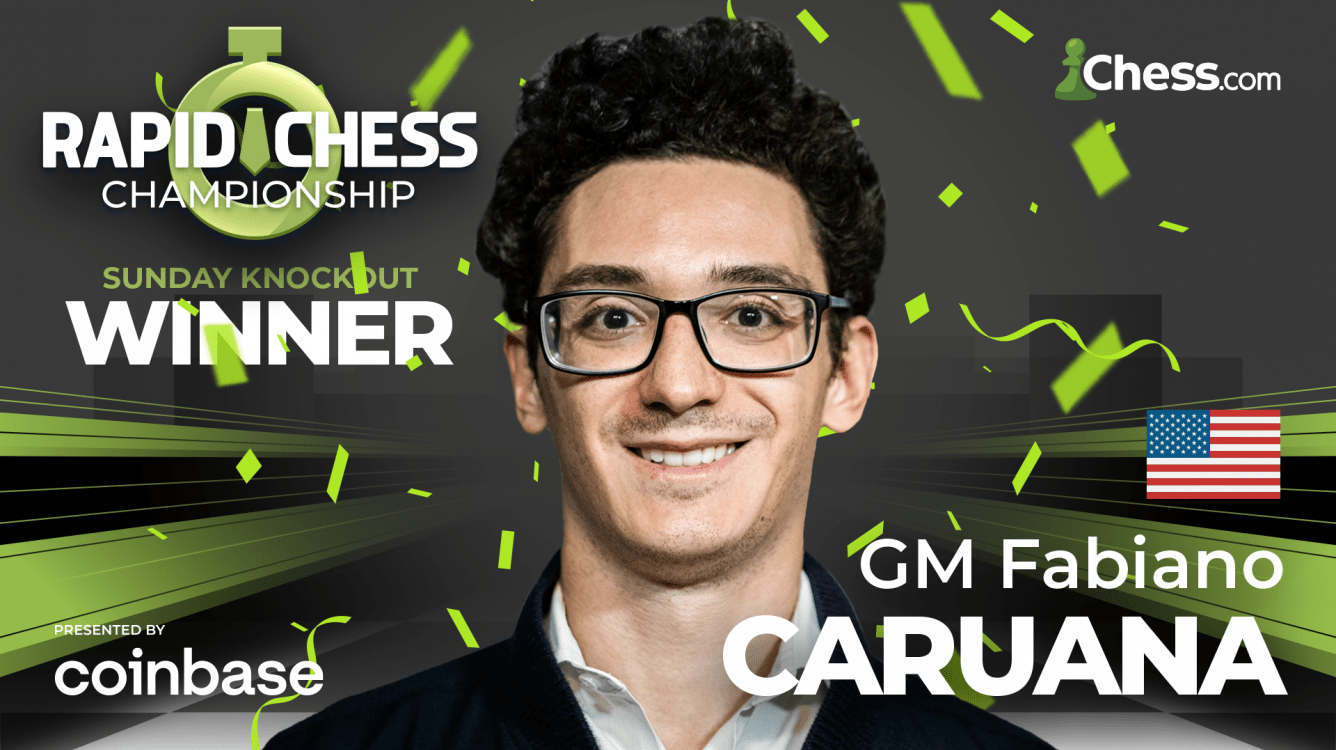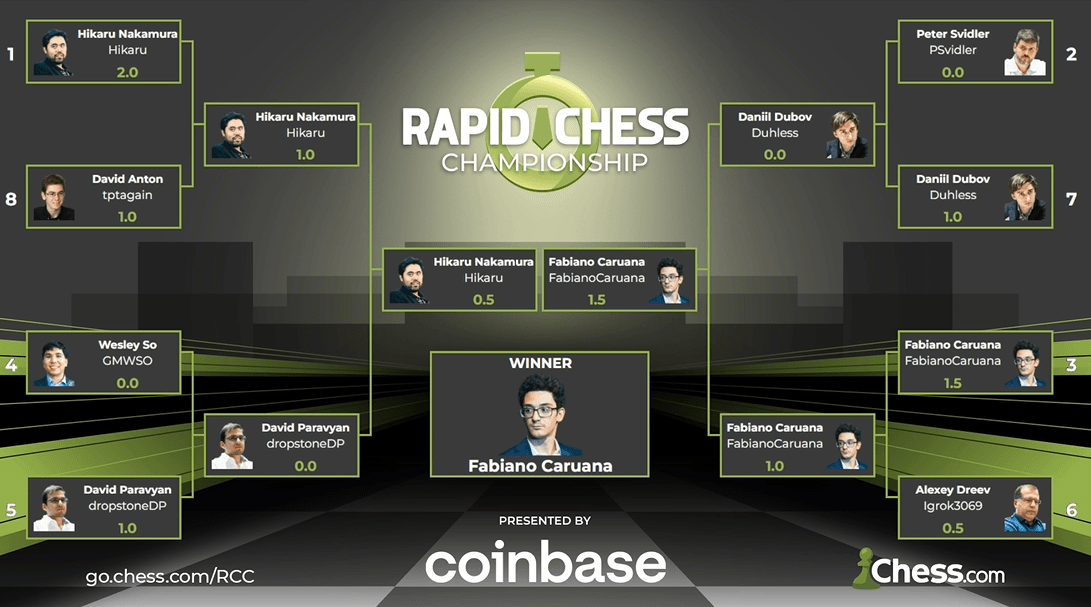
Rapid Chess Championship Week 2: Caruana Wins
GM Fabiano Caruana won the knockout phase of week two of the 2022 Rapid Chess Championship tournament presented by Coinbase. GM Hikaru Nakamura finished second in the knockout—after taking first in the preliminary Swiss tournament, like GM Anish Giri did last week—while GMs Daniil Dubov and David Paravyan finished in the semifinals and GMs Wesley So, Alexey Dreev, Peter Svidler, and David Anton Guijarro finished in the quarterfinals. Interestingly, all the top-eight players besides Anton were Russian or American.
Participating in the event were 48 elite players of the invited FIDE top 100, top 10 women, and top 10 juniors in the world, alongside 10 wildcards. The event will continue next weekend, February 26-27, starting at 9 a.m. Pacific / 18:00 Central European.
You can watch the 2022 Rapid Chess Championship presented by Coinbase on Chess.com/TV. You can also enjoy the show on Twitch channel and catch all our live broadcasts on YouTube.com/ChesscomLive.
The Rapid Chess Championship is a weekly tournament held by Chess.com. It is a nine-round Swiss event with a 10+0 time control held every Saturday, followed by a knockout event on Sunday between the top eight finishers and a 10+2 time control. If players draw, they play another 3+2 game; if drawn, they play a 1+1 game; and if that is drawn, a single armageddon game is played.
Swiss
In a field this strong, it is ingenuine to say that the favorites prevailed, as virtually every participant is more than qualified to place in the top eight. Nevertheless, the top eight finishers included household names like Nakamura, Caruana, So, Dubov, and arguably Paravyan (who qualified last week too).
However, some new names did manage to qualify: Svidler, Dreev, and Anton. Let's not pretend they are underdogs by any stretch of the imagination, but the high scores of Svidler (age 45), who finished second behind only Nakamura, and Dreev (age 53), who time and again played his moves at a surprisingly fast and sometimes bullet-chess pace, should perhaps remind the young generations that the stage must still be shared.
Frankly speaking, Nakamura zipped through the tournament, maintaining his first-place spot for the entire event much in the same way Giri did last week. Despite finishing a half-point above the field with 7/9, he even had the highest tiebreak score after defeating GMs Bogdan-Daniel Deac, Dreev, Arjun Erigaisi, Svidler, and Vladimir Fedoseev, funnily splitting the half-point with Caruana and So with the exact same well-known Berlin draw that we see quite often.
One of the most satisfying wins has to be his first-round game against Deac where the latter traded queens to enter a pawn-up endgame but unfortunately found himself completely paralyzed.
Svidler defeated GMs Benjamin Bok, Pavel Ponkratov, Grigoriy Oparin, Anton, and Erigaisi, dropping only one loss to Nakamura, to convincingly place second. His last-round endgame win against Erigaisi displayed a similar theme of paralysis to Nakamura's shown above, but the following featured fighting chess by both sides, with Oparin making the last mistake in a position where both players fought bravely for the win.
The last round of the Swiss could not have ended more dramatically as Anton saved a position down two pawns and dazzled the spectators with a very unusual endgame (see below). With this save, he beat out Fedoseev by less than one tiebreak point to finish in eighth place on 5.5/9. And who said there isn't luck in chess?
The best move in the following position would have been 63...d1=B!!. However, it turns out the seven-piece tablebases confirm a technical win with 63...d1=N as well because the white knight can ultimately be separated from the white king and captured.
Indeed, for those interested in the theoretical question of whether two bishops can defeat a knight in a pawnless endgame, the answer is... sometimes. The superior side needs to separate the enemy king and knight to trap the last piece, and it helps if the enemy king is pushed against the edge of the board—one famous example is from the 1961 world championship rematch where GM Mikhail Tal successfully won such an endgame against GM Mikhail Botvinnik.
Although he did not ultimately place in the top eight, Erigaisi played a barn burner of a game, leaving his a1-rook hanging with check—much like Adolf Anderssen's immortal game from 1851—and ultimately breaking through to the black king with a series of rook sacrifices.
Saturday Swiss | Final Standings (Top 20)
| # | Rk | Fed | Title | Username | Name | Rating | Score | SB |
| 1 | 5 | GM | @Hikaru | Hikaru Nakamura | 2864 | 7 | 38 | |
| 2 | 19 | GM | @PSvidler | Peter Svidler | 2760 | 6.5 | 32.5 | |
| 3 | 1 | GM | @FabianoCaruana | Fabiano Caruana | 2854 | 6.5 | 32 | |
| 4 | 7 | GM | @GMWSO | Wesley So | 2754 | 6 | 32 | |
| 5 | 2 | GM | @dropstoneDP | David Paravyan | 2864 | 6 | 29.25 | |
| 6 | 21 | GM | @Igrok3069 | Alexey Dreev | 2647 | 6 | 23.25 | |
| 7 | 6 | GM | @Duhless | Daniil Dubov | 2716 | 6 | 22.25 | |
| 8 | 25 | GM | @tptagain | David Anton Guijarro | 2639 | 5.5 | 25.5 | |
| 9 | 36 | GM | @Bigfish1995 | Vladimir Fedoseev | 2640 | 5.5 | 24.75 | |
| 10 | 3 | GM | @BillieKimbah | Maxim Matlakov | 2690 | 5.5 | 23.75 | |
| 11 | 29 | GM | @daro94 | Dariusz Swiercz | 2611 | 5.5 | 23.25 | |
| 12 | 22 | GM | @GGuseinov | Gadir Guseinov | 2654 | 5.5 | 22 | |
| 13 | 32 | GM | @Msb2 | Matthias Bluebaum | 2546 | 5.5 | 20.25 | |
| 14 | 13 | GM | @viditchess | Vidit Gujrathi | 2642 | 5.5 | 18.5 | |
| 15 | 11 | GM | @vladislavkovalev | Vladislav Kovalev | 2690 | 5 | 24.5 | |
| 16 | 10 | GM | @GHEEVAM2003 | Arjun Erigaisi | 2706 | 5 | 23.5 | |
| 17 | 14 | GM | @mishanick | Alexey Sarana | 2655 | 5 | 21.75 | |
| 18 | 20 | GM | @viviania | Vassily Ivanchuk | 2613 | 5 | 17.25 | |
| 19 | 42 | GM | @GMBenjaminBok | Benjamin Bok | 2419 | 5 | 16.5 | |
| 20 | 33 | GM | @spicycaterpillar | Ray Robson | 2500 | 5 | 11 |
(Full final standings here.)
Knockout
Nakamura and Anton took the first quarterfinal match all the way to the 1+1 portion, the last tiebreak game before an armageddon game would be played. The Spanish grandmaster had chances to win and was better in the first two games, especially reaching a winning rook endgame in the blitz game, but ultimately could not convert the advantage in either game and lost in the final bullet game after dropping a piece with low time.
Paravyan successfully defeated So in their first game as the latter misstepped with 36.Rb6 and, with two pieces now hanging, was forced to embark on a sacrificial attack that simply did not work.
The Svidler-Dubov quarterfinal match had Svidler seemingly cruising to victory after outplaying his compatriot with White in the English Opening only to misjudge the counterplay (he called missing 19...c4 a "brain fart" on his stream), lose an entire rook, blow up the position into chaos, and lose after failing to generate a perpetual check with his queen.
Caruana, with the white pieces against the Nimzowitsch Sicilian, cemented two doubled pawns on the c-file, pressured the black position with masterful technique, and was about to win when—up two pawns—he suddenly allowed the following theoretical draw:
After the game, he admitted: "Not winning with two pawns up in a rook endgame was quite impressive. ... That was terrible. ... It's quite helpful that the next game starts like right away." Caruana corrected the score in his favor in the second game, finally breaking through yet another stern defense. "I thought it was headed for a draw, and suddenly his bishop was trapped," said Caruana after the game, and he did not blink twice before collecting the point:
All in all, the semifinals featured two convincing and one-sided wins. Nakamura defeated Paravyan with his usual quickly-played strategic squeeze, finishing off with a well-calculated transition to a winning rook endgame:
Caruana won a backward pawn on d6 in a Classical Sicilian against Dubov and went on to convert a clean game. Those interested can look into 33...Bd7, which the engine says could have (maybe?) held, but in a practical game, it's very unlikely one can hold a three-pawns-down position like this.
The final featured an all-American duel between Nakamura and Caruana. The match started with a quick Berlin draw. With the white pieces, Nakamura implicitly headed toward the blitz and bullet games where he felt he would be the favorite.
The first #rapidchess final game lasted literally less than one minute. 🤪 pic.twitter.com/8QjhyqvgTI
— ChesscomLive (@ChesscomLive) February 20, 2022
What happened next, however, shook the commentators and spectators alike. Over the last few years—especially since the 2018 world championship—Caruana earned a reputation for somehow being weaker in blitz and rapid formats, and perhaps this final game and tournament as a whole will silence those who still harbored doubt.
Caruana explained after the game: "He blundered with dxc. ... He missed Rxd6... [and] the moves came naturally [for me from there]."
In the post-tournament interview when asked about whether rapid and blitz can help contribute to one's classical chess skill, Caruana responded: "No, I think it's just two totally different types of chess... and I don't know if focusing on your rapid and blitz is good for your classical."
"I wasn't surprised when Nakamura won the Grand Prix... against Levon. I assumed it was 50/50, but I didn't consider him an underdog at all. In rapid chess, he's extremely formidable."
Standings, Results, Prizes
The winner of the Swiss tournament is Nakamura, and the winner of the knockout tournament is Caruana. Below are the full standings and prizes of the knockout:
Sunday Knockout | Final Standings
| # | Fed | Player | Place | Prize |
| 1 | Fabiano Caruana | Winner | $7,500 | |
| 2 | Hikaru Nakamura | Finalist | $3,500 | |
| 3-4 | Daniil Dubov | Semifinalist | $2,500 | |
| 3-4 | David Paravyan | Semifinalist | $2,500 | |
| 5-8 | Wesley So | Quarterfinalist | $1,000 | |
| 5-8 | Alexey Dreev | Quarterfinalist | $1,000 | |
| 5-8 | Peter Svidler | Quarterfinalist | $1,000 | |
| 5-8 | David Anton Guijarro | Quarterfinalist | $1,000 |

The Rapid Chess Championship is brought to you by Coinbase. Whether you’re looking to make your first crypto purchase or you’re an experienced trader, Coinbase has you covered. Earn crypto by learning about crypto with Coinbase Earn, explore DeFi and web3 with Coinbase Wallet, get exclusive rewards when you spend with Coinbase Card, and much more. Learn more at coinbase.com/chess and get $10 in bitcoin when you sign up and verify your account.
Previous coverage


